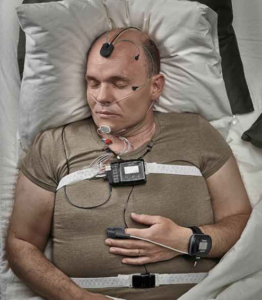Sleep Tests
How do we work out what’s going on at night?
What is a Sleep Study?
 This is a test that measures sleep and sleep disorders overnight. The test can be done in hospital or at home (called an ambulatory or unattended sleep study).
This is a test that measures sleep and sleep disorders overnight. The test can be done in hospital or at home (called an ambulatory or unattended sleep study).
When done in hospital, the patient needs to spend a night in the lab, which is usually a single, private room in a quiet area within the Hospital. A Sleep Scientist will meet you and explain what will happen. Essentially, you will be encouraged to have as normal a night’s sleep as possible, while we monitor your bodily functions. This is done by many leads attached to your face, scalp, chest, belly and legs together with various other monitors. While it may sound very intrusive, in fact we find that typically people (perhaps surprisingly) sleep quite well in the lab. If necessary we can give you a mild sleeping tablet.
In order to encourage a restful sleep we would like you to arrive feeling relaxed rather than rushed. A warm shower before sleep often helps bring on sleep, and, of course, we advise against coffee/tea in the evening. You may drink whatever alcohol is your normal custom (we don’t want to interfere with your usual routine, but rather simply observe it). You can get up and go home whenever you would like – as long as we have at least several hours of sleep. People often get up in the morning, shower, have breakfast and go to work.
There is also the option of undergoing a home sleep study. This is done when it would be unlikely that the patient would sleep in a hospital or when the patient usually sleeps at odd hours. This usually provides accurate results, however, there is no overnight sleep scientist observation. Thus will influence the test result negatively if some of the information is lost and might result in a referral for a hospital sleep study.
Does it hurt?
No. Sometimes, if the skin is oily it has to be rubbed firmly, and this can be uncomfortable but you should not expect it to be painful, draw blood or scar.
Where are the Sleep Labs on the Mornington Peninsula?
There are several Sleep Labs on the Peninsula.
There is a single Lab for those that don’t have Private Health Insurance. This is at Frankston Public Hospital, and the waiting period is usually around 3 to 4 months. The phone number to organise a Sleep Study at Frankston Public Hospital is 03 9788 1705.
There is one Private Sleep Lab for those that have Private Health Insurance in Mornington, at Beleura Private Hospital. The waiting period is very short (usually within a month), and the cost is whatever the excess is on your Health Insurance. This varies from nothing up to $500. Most patients only have to pay the excess once a year. The phone number to organise a Sleep Study at Beleura Private Hospital is 03 5976 0805 and the fax number is 03 5975 9144.
Where are the Home sleep studies done on the Mornington Peninsula?
Home sleep study set-ups are done at 215 Jetty Road, Rosebud from Monday to Friday.
The phone number is 03 5986 7136 or 0417 308 259 and the fax number is 03 8679 4448.
Home sleep studies are currently bulk billed. The test result are usually available within 10 days (unless unforeseen circumstances happen).
How do I organise a Sleep Study?
Firstly, you must see your GP and explain why you think a Sleep Study would be appropriate. He/she can refer you directly for a Sleep Study (at any of the 3 Sleep Labs or home sleep study locations), or alternatively involve a Sleep Specialist. There are 5 Specialists on the Peninsula (who might send you for a Sleep Study).
You can only access the Government Subsidized CPAP program with a hospital sleep study. The criteria for this program is under CPAP guidelines on this website.
How long does it take for the result to get back to the doctor?
The data collected overnight is assessed manually by a Scientist, and then reviewed and reported by an accredited Sleep Specialist. A final report will be written and sent to all the doctors involved in your care. You can expect this whole process to take up to a fortnight (although usually it would be quicker than that).
What happens then?
Do not assume that the lab will call you. It won’t, regardless of the result. It is therefore vital that you have a follow-up appointment with the doctor that referred you for the test. He/she will explain the result to you, and also what the next steps will be.
